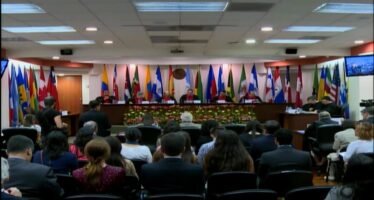Saving the Common Currency
![]()
German Obstructionism Heightens Euro Fears
By Charles Hawley
German Chancellor Angela Merkel is under fire in Europe these days for her opposition to plans aimed at propping up the euro.
All eyes are on Brussels this Thursday as European leaders gather to discuss ways to solve the ongoing euro crisis. So far, though, German Chancellor Angela Merkel has proven unwilling to consider measures that may require additional German funds. Others in the EU are getting anxious.
German Chancellor Angela Merkel is walking a tightrope. And on Wednesday, one day before European Union leaders gather in Brussels for consultations on the ailing common European currency, the euro, one could almost see her struggling to retain her balance.
Speaking in front of the German parliament in Berlin, Merkel sang the praises of the “extraordinary ideas of peace and freedom which provide the foundation of European unity.” It is a legacy, she went on, “to which I feel personally beholden.”
Fine words, to be sure. But there are some in Germany who have found cause to doubt the sincerity of Merkel’s commitment to the European Union. The German chancellor, after all, has become a stick in the deep mud of the ongoing euro crisis, one which has seen country after country fall victim to skyrocketing interest rates on government bonds, making borrowing on the international financial markets virtually impossible.
Merkel, though, has seemed unmoved. While Germany made a large contribution to the Greek bailout package in the spring, and to the massive, €750 billion ($990 billion) common currency backstop established earlier this year, Berlin has shown little interest in increasing or extending that fund. The idea of a European bond — one which would bundle the debt of European countries, thus making it more affordable for troubled states to borrow on the bond market — has likewise found little support in Merkel’s Chancellery.
‘Haughtiness and Arrogance’
Her stance has not been popular in other European capitals. Luxembourg Prime Minister Jean-Claude Juncker has accused her of “thinking a little simply” and said she was displaying an “un-European manner.” His foreign minister, Jean Asselborn, went even further in an interview on Wednesday, blaming Germany of “haughtiness and arrogance.”
And the demands keep coming. On Wednesday, Spanish Finance Minister Elena Salgado insisted that the €750 billion fund, known as the European Financial Stability Facility (EFSF), be enlarged — a position supported by several countries in the euro zone. The idea mentioned in some European capitals is to double the size of the fund, to €1.5 trillion. Salgado also floated the idea that the EFSF could buy sovereign bonds from troubled countries, much as the European Central Bank has been doing.
The proposal, much like Merkel’s rejection of all such measures, is somewhat self-serving. The ratings agency Moody’s said on Wednesday it may downgrade Spanish debt rating in the near future, saying it was concerned about Spain’s 2011 funding needs and mounting debt.
There is, in short, plenty to discuss at the European Union summit on Thursday and Friday. SPIEGEL ONLINE provides a brief cheat sheet.
Related Articles
Thai PM quits party post after poll defeat
![]()
Abhisit Vejjajiva resigns as Democrat party head after Yingluck Shinawatra leads opposition Pheu Thai party to victory Abhisit Vejjajiva, the
Corte Penal Internacional: de cara a la elección de jueces titulares
![]()
En esta segunda quincena del mes de diciembre, se realiza la Asamblea de Estados Partes de la Corte Penal Internacional (CPI) en La Haya: véase comunicado oficial de la CPI al respecto.
Turkish President Gül demands ‘wise’ use of police force
![]()
ANKARA – Hürriyet Daily News Police used pressurized water to disperse crowd at Istanbul’s ?stiklal Avenue during protests against




